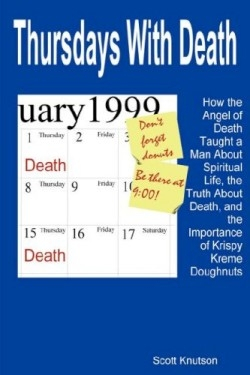Thursdays With Death
How the Angel of Death Taught A Man About Spiritual Life, The Truth About Death, And The Importance of Krispy Kreme Doughnuts
Sometimes you cannot believe what you see, you have to believe what you feel. And if you are ever going to have people trust you, you must feel that you can trust them, too—even when you’re in the dark. Even when you’re falling.
—Mitch Albom, Tuesdays With Morrie
This dialogue-dominated comic send-up of Albom’s zillion-seller retains a surprisingly sincere core message about the primacy of love and helping others. It follows the evolution of Lanny Stone, who is forced out of a unexceptional existence by losing a high stakes hand of Texas Hold-Em to a guy with a record of successfully collecting 100% of debts owed him. He agrees to weekly lunches with the doughnut-inhaling specter who incrementally nudges him toward enlightenment, changing from a potential adversary to a friend.
It turns out that an individual’s assumptions about the angel of death’s appearance determine what they see, whether that be a traditional Grim Reaper with a void for a face, which the protagonist initially perceives; or a debonair carbon copy of Johnny Depp. Death has all the important points boiled down to comprehensible aphorisms, such as this sensible redirection: “‘The intellect can only take you so far. You also need experience and feeling to get what you want.’” And this technological simile: “‘As you become more consciously aware, you become something like a two-way radio, both receiving and sending varying levels of energy.’”
The dual tasks of eliciting laughter and sharing meaningful ideas are largely fulfilled. Certain passages show inadequate variation in word choices with a degree of repetition or echoing. Knutson’s assertions regarding the mechanics of dying and the nature of afterlife are in line with mainstream interpretations of largely Christian theory overlaid with aspects of Buddhism and Sufism. The book contends that everyone has the opportunity to choose the circumstances of their own death. God and Death function here as a task oriented manager/employee team. In accordance with Newton’s Laws of Conservation, a form of compassion is universally transportable.
Lanny’s life seems nearly pointless, though not quite wasted. A character engaged in unquestionably purposeful earthly undertakings might argue more forcefully than Lanny does against the inevitable, perhaps buying time. That’s a lesson to us all: Death is coming—look busy. For those who think that Mitch Albom could be rolling over in his grave from the fairly close derivation, rest assured that he is very much alive and not known to be punitively litigious. Morrie however may be attending a card game somewhere, driving up the bets on someone who is about to learn what comes next.
Reviewed by
Todd Mercer
Disclosure: This article is not an endorsement, but a review. The publisher of this book provided free copies of the book and paid a small fee to have their book reviewed by a professional reviewer. Foreword Reviews and Clarion Reviews make no guarantee that the publisher will receive a positive review. Foreword Magazine, Inc. is disclosing this in accordance with the Federal Trade Commission’s 16 CFR, Part 255.

